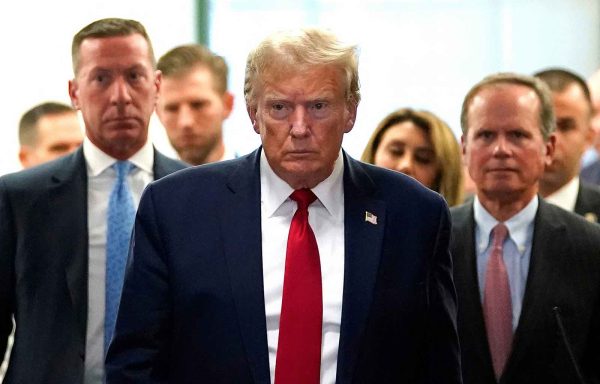Will he have the pull for the November election?

Former US President Donald Trump departs during a break in the civil fraud trial against the Trump Organization. Photo by Timothy A. Clary / AFP
Mohamed Ahmed
Contributor
The Michigan Republican primary happened just over a month ago, and the Republican landscape has changed dramatically since then.
One notable exception was the suspension of Nikki Haley’s campaign for winning only one state on Super Tuesday, a day where fifteen states and one territory vote in their primaries. This left Donald Trump as the only remaining candidate running for the Republican . Trump then secured enough delegates to become the Republican nominee.
Additionally, Trump ousted current Republican National Committee Chair Rona McDaniel and replaced her with North Carolina Republican State Party Chair Michael Whatley and his daughter-in-law Laura Trump as co-chairs. These moves continue to show the influence Trump has in the Republican Party.
But while Trump’s grip on the Republican party is clear, the question is: does he have a chance to win in 2024?
According to recent CBS poll data, Trump holds strong positions on issues like immigration, the economy and crime. He also leads in many polls in swing states that are critical to winning elections and benefits from his age, where he is seen in a better light than his less popular opponent. Trump has also seen increased support among African-American and Latino voters.
But the former president has his problems and issues. Trump’s ongoing legal battles, particularly in two federal cases where his legal team are arguing for presidential immunity, have been a major source of concern.
A Politico Magazine/Ipsos poll found that 70% of respondents disagreed that the president was safe from prosecution for actions taken while in office. Even if the Supreme Court rules in favor of the former president, he could have electoral problems.
Trump’s recent controversial comments further illustrate his vulnerability. From proposing opening Medicare to cuts to divisive comments about Jewish Americans who vote for Democrats, Trump’s rhetoric could erode his support base, especially in swing states where his lead is 5% or so less.
Although these strategies could strengthen its base, they risk alienating moderate independent voters and wavering voters critical to electoral success. Thus, Trump’s dominance in the polls should not obscure his fluctuating support, which could influence his controversial rhetorical and policy positions.
With the election only seven months away, President Trump remains a unique candidate–a former president who has been indicted on both federal and state levels.
Now leading in polls, he still faces major legal challenges which could have electoral problems. As we look ahead to the coming months, it will be important to see how he navigates these obstacles. Whether he emerges victorious can only be seen on election night.
This is part one of an ongoing political analysis series. Check back in to the Voice’s April 16 issue to see part two covering the Michigan Democratic primary.
Editor’s Note: This story has been updated to correct Laura Trump’s relation to Donald Trump: she is his daughter-in-law.


